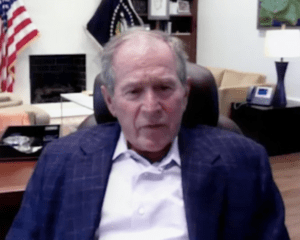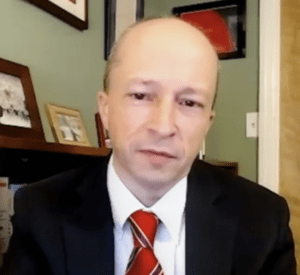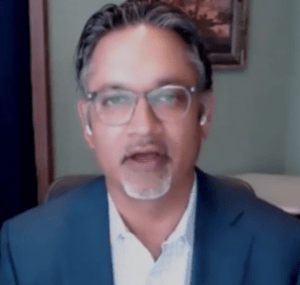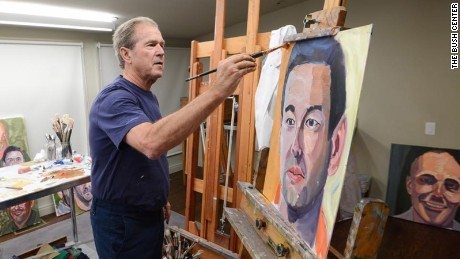Healing the divisiveness of immigration in American politics and society requires a view of immigrants as vital cultural and economic contributors and as fellow human beings made in God’s image, former President George W. Bush said during a May 6 webinar moderated by Russell Moore, president of the Southern Baptist Convention’s Ethics and Religious Liberty Commission.
“It all depends on where you start your philosophy. I started mine from the belief that all life is precious and we’re all God’s children. If that’s how you view immigration, then you don’t view people with hostility,” Bush said during “Immigrants and the American Future,” a virtual event organized by the George W. Bush Presidential Center in Dallas.

George W. Bush speaking on the webinar.
It also would be helpful if more churches adopted a humanizing attitude toward immigrants, Bush added. “Until there is a religious awakening to a certain extent, a kind of revival,” it will be difficult to change many Americans’ negative perception toward immigrants.
The webinar continued the 43rd president’s ongoing public efforts to promote a compassionate immigration posture that includes a strong border policy. He pitched both concepts during his online conversation with Moore and Yuval Levin, an Israeli-born American who served in the George W. Bush White House and now serves as the director of social, cultural and Constitutional studies at the American Enterprise Institute.
“Loving doesn’t mean tearing down a border wall. Loving means treating people with respect,” Bush said.
That is the theme of Bush’s new book, Out of Many, One: Portraits of America’s Immigrants, which framed the webinar discussion. The book is a collection of 43 immigrant portraits painted by the former president and accompanied by stories of their contributions to American life.
The potential role of religion in addressing immigration also came up during the conversation, most notably when Moore mentioned polls showing many Christians oppose immigration.
Bush responded that Moore should recruit speakers to remind Southern Baptists of their calling to help the vulnerable, and that religious groups in the U.S. have become distracted.
Bush responded that Moore should recruit speakers to remind Southern Baptists of their calling to help the vulnerable, and that religious groups in the U.S. have become distracted. “The fundamental question is … are our churches too political? Are they focused on the right mission?”
But he added that anti-immigrant periods have come and gone in U.S. history, and that he is generally optimistic progress can be made on instituting compassionate immigration reform.
A way to begin is by ensuring the future viability of the Deferred Action for Childhood Arrivals program, Bush said.
DACA was created by the Obama administration to prevent the deportation of immigrants brought illegally into the United States as young children. President Trump’s efforts to end the program were blocked by the courts. Legislation related to citizenship is being considered in Congress while a Texas judge is expected to rule on DACA’s constitutionality.
But most Americans can agree that immigrants who arrived as infants or children and were raised in the U.S. are a special case and may help foster cooperation in Congress, Bush said. “Most Americans can see that DACA can be fixed and to me, that’s a good place to start.”

Yuval Levin
Levin added that DACA offers the potential for finding “common ground” on immigration legislation because it illustrates “that what we are talking about is not an abstract set of policy problems, but real human lives and people who have tried to improve their lives and also improve our country.”
That, in turn, could widen support as understanding grows that “immigration can be great for us” because immigrants have been “at the forefront of every field of scientific endeavor, of technology and of industry,” Levin said.
Putting a face on the issue of immigration was the goal of Bush’s new book, he said, pointing to a portrait of an immigrant who helped raise him and his siblings. “She ended up being as tough as my mother — which is pretty damned tough. Hers is a story of hard work and perseverance.”
Another painting presents Levin. “Immigrants have brought enormous brain power to our country, and Yuval was one of the most perceptive in my administration,” Bush said.
The former president said he published the book to “bring a different perspective to immigration” in a nation where many Americans fear it. “We should not fear the erosion of our culture. Immigrants enhance our culture of freedom and our freedom of religion and our freedom of speech.”
“Immigrants enhance our culture of freedom and our freedom of religion and our freedom of speech.”
Part of the “compassion agenda” of the book is that its proceeds will go to organizations that help in the resettlement of immigrants, asylum seekers and refugees.
Levin added that the portraits transform immigrants from enemies into neighbors. “It humanizes an issue that can easily become dehumanized, or where we can … talk about each other in abstract terms” and devolve into arguments around “some kind of technocratic policy.”
Bush’s interest in immigration by no means began with his new book, said Ali Noorani, president and CEO of the National Immigration Forum.

Ali Noorani
Noorani, who introduced the former president during the webinar, recalled Bush’s push for comprehensive immigration reform in 2001 and also his public embrace of the U.S. Muslim community immediately after the Sept. 11 terror attacks.
“I remember hearing his words and just being so incredibly grateful for his leadership at that critical moment,” Noorani said.
Bush cited a general absence of leadership for the lack of reform today and said he is working to build a coalition at the center to make “bite size pieces” of progress.
“Let’s keep this issue alive,” he said. “Let’s focus on where we can find common ground, here.”

